Seeking Teens and Young Adults for Our Youth Advisory Council
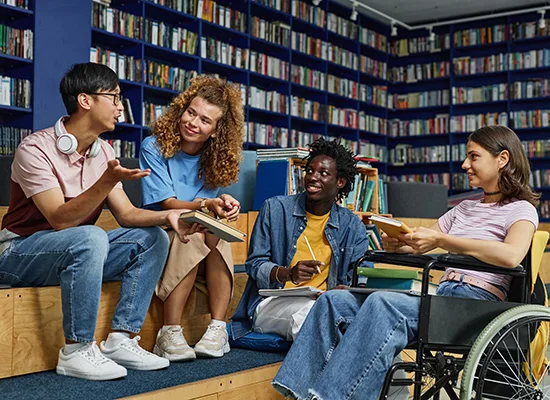
The council is a great opportunity to share your voice and help improve transition support for youth across Illinois.
Calling all teens and young adults with special healthcare needs in Illinois!
Would you like to make a difference? Your voice can help shape programs and services for youth like you across the state.
We are looking for new members to join our Youth Advisory Council (YAC).
The YAC is an opportunity to share your feedback and help improve planning for the transition to adulthood. You can also strengthen your leadership skills and connect with other youth.
As a YAC member, you can:
- Learn about and help improve how the transition to adulthood works for Illinois youth with special healthcare needs
- Help us gain a better understanding of your and your peers’ transition needs
- Give a voice to what matters most to you
- Gain valuable leadership and advocacy experience
- Expand your network
The council is open to all Illinois youth ages 15 to 24 with special healthcare needs.
You do not need to be a Division of Specialized Care for Children (DSCC) participant to join.
How to Join and Learn More
Members must complete an online application to join. (The application is also available in Spanish.)
Visit our Youth Advisory Council page for more information and answers to frequently asked questions.
You can also see the YAC flyer for more details:
If you have questions, please contact Claire Cook, DSCC’s Title V Program Transition Specialist, at clairer3@uic.edu or (800) 322-3722, ext. 21812.
Your perspective matters!
Research Study Opportunity on the Transition to Adult Care
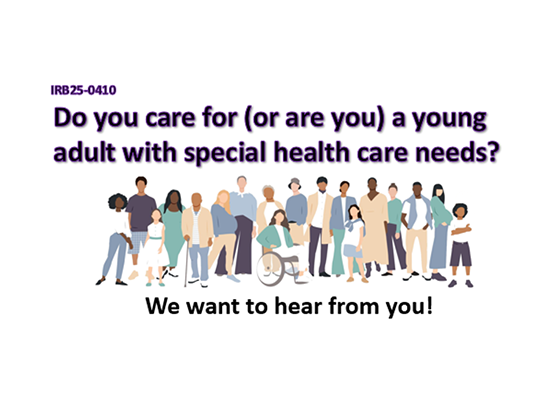
The study seeks people with special healthcare needs between the ages of 20 and 30 and their families
Researchers at the University of Chicago are exploring how care changes for people with special healthcare needs as they age out of pediatric care and transition to adult care.
The research study is recruiting people with special healthcare needs between the ages of 20 and 30 and their families to participate in interviews.
People with special healthcare needs have significant chronic conditions that usually require consistent management by more than one type of doctor.
Study participants will have a recorded one-hour Zoom or in-person interview with researchers.
The researchers will ask questions about the transition to adulthood, including what doctors an individual went to and how their health care might have changed.
Participants will receive a $150 gift card for their time.
To enroll, please fill out this form or contact Silvia Arbelaez-Ellis at silviaae@uchicago.edu.
The enrollment form is also available in Spanish.
If you have questions, you can also contact the lead researcher, Betsy Cliff, at bqcliff@uchicago.edu.
Webinar Series to Help Families, Caregivers and Youth Navigate the Transition to Adulthood
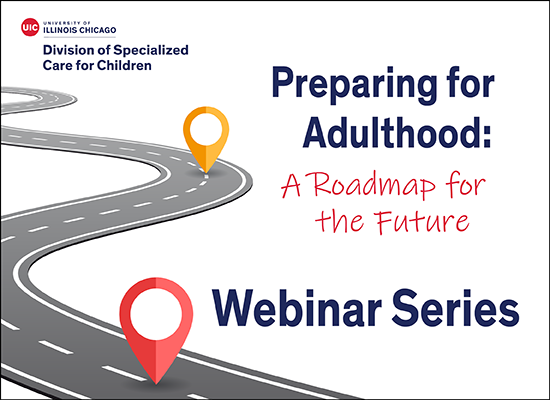
Learn practical strategies and tools to plan for the transition to adulthood during our free two-part series
Families can face new challenges and shifting roles as young people move toward adulthood.
Join the Division of Specialized Care for Children (DSCC) to learn more about navigating this journey during our free “Preparing for Adulthood: A Roadmap for the Future” webinar series.
The two-part series will feature Claire Cook, DSCC Title V Transition Specialist, and Suzanne Aaron, Northern Illinois Outreach Specialist for Illinois Life Span.
The sessions will cover:
- “Session One: Navigating Adult Systems,” June 26 at 6 p.m.
This session is for youth ages 12 to 15 and their families. Families with children at other developmental stages are also welcome to attend.
This session will provide practical tools for exploring and understanding adult systems, such as health care, education, employment and more. It will also cover strategies for balancing independence and guidance as family roles evolve.
- “Session Two: Empowering Parents and Caregivers,” July 31 at 6 p.m.
Session two is for parents, caregivers and families of youth ages 16 and older with complex needs and/or disabilities.
Building on session one, participants will dive deeper into adult guardianship, health insurance, benefits and programs for youth with complex needs. The session will focus on creating meaningful daily routines while managing evolving family dynamics. It will also explore the role of support circles and how to make decisions that support youth and caregivers in the long run.
- “Primera sesión: Recorrer los sistemas de los adultos,” 26 de junio a las 6 p. m.
Esta sesión es para padres, cuidadores, familias y jóvenes de 12 a 15 años. Las familias de jóvenes en otras etapas de desarrollo también son bienvenidas.
- “Segunda sesión: Empoderar a los padres y cuidadores,” 31 de julio a las 6 p.m.
Según la primera sesión, este seminario web se centrará en tutela de adultos, seguro médico, beneficios y programas para jóvenes con necesidades complejas, crear rutinas diarias importantes mientras se maneja la dinámica familiar en evolución y la función de los círculos de apoyo y cómo tomar decisiones que apoyen a los jóvenes y a los cuidadores a largo plazo. Esta sesión ofrecerá a las familias conocimientos y estrategias adaptadas a sus retos únicos.
Each presentation will be in English. Live Spanish interpretation will be available.
The recordings and slides for both sessions will be available on our Family Education Webinars page.
If you have questions about the series, please contact Claire Cook at clairer3@uic.edu or (800) 322-3722.
Please spread the word and plan to join us!
Annual Illinois Statewide Transition Conference Maps Out Routes to Adulthood
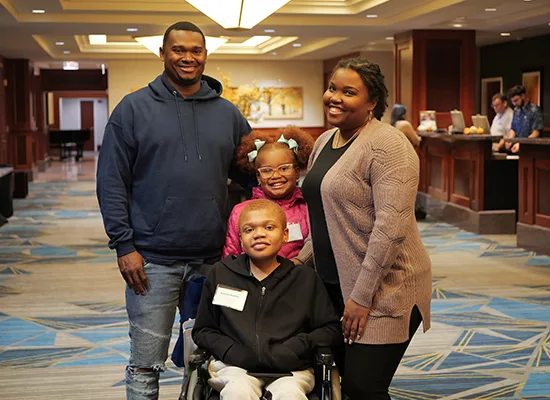
The annual Illinois Statewide Transition Conference provides valuable opportunities and resources to help youth and young adults with disabilities navigate the transition to adulthood.
Turning 18 is a major milestone. For Brenton Braxton and his family, they approached it with a mix of excitement and many questions about the future.
What benefits can Brenton qualify for as an adult? What should they know about guardianship and power of attorney?
Brenton has Duchenne muscular dystrophy, a genetic disorder that causes his muscles to weaken over time.
“When Brenton was first diagnosed when he was 7, these things that are being presented to us now – at that time, we had no idea that we’d be able to be at this place. So, that’s why my word I keep using is a sense of excitement because… Brenton’s still thriving,” his mom, Veneise, said.
Brenton is now a senior in high school with a strong interest in sports and a desire to go to college and “live life to the fullest.”
To help Brenton and his family prepare for what’s next, their Division of Specialized Care for Children (DSCC) Care Coordinator recommended they attend the Illinois Statewide Transition Conference.
The annual event provides valuable resources and information to help youth with disabilities and their families navigate the transition to adulthood.
“One of the major reasons why we wanted to attend this conference is that we wanted to get in the room with the resources. We wanted to get to the people, talk to the people, engage with the people that can say, ‘Hey, here’s what your child qualifies for. Hey, try this program for him, do this, go down this avenue,'” Veneise said.
“You just really want to have your feet grounded in knowing what’s getting ready to happen.”
The Braxtons were among nearly 450 people who attended the 19th Illinois Statewide Transition Conference, titled “Stepping Stones of Transition,” on Nov 7-8, 2024, at the Crowne Plaza Hotel and Convention Center in Springfield.
The transition conference brings together youth with disabilities, parents, caregivers, vocational professionals, healthcare professionals, educators and more.
Youth with disabilities and their families can network and find answers to common questions about the transition to adulthood, including:
- What happens after I leave high school?
- How do I sort through the maze of resources?
- What steps can I take now to prepare for upcoming changes?
- What skills are important for me to develop?
“Here we all are in one space.”
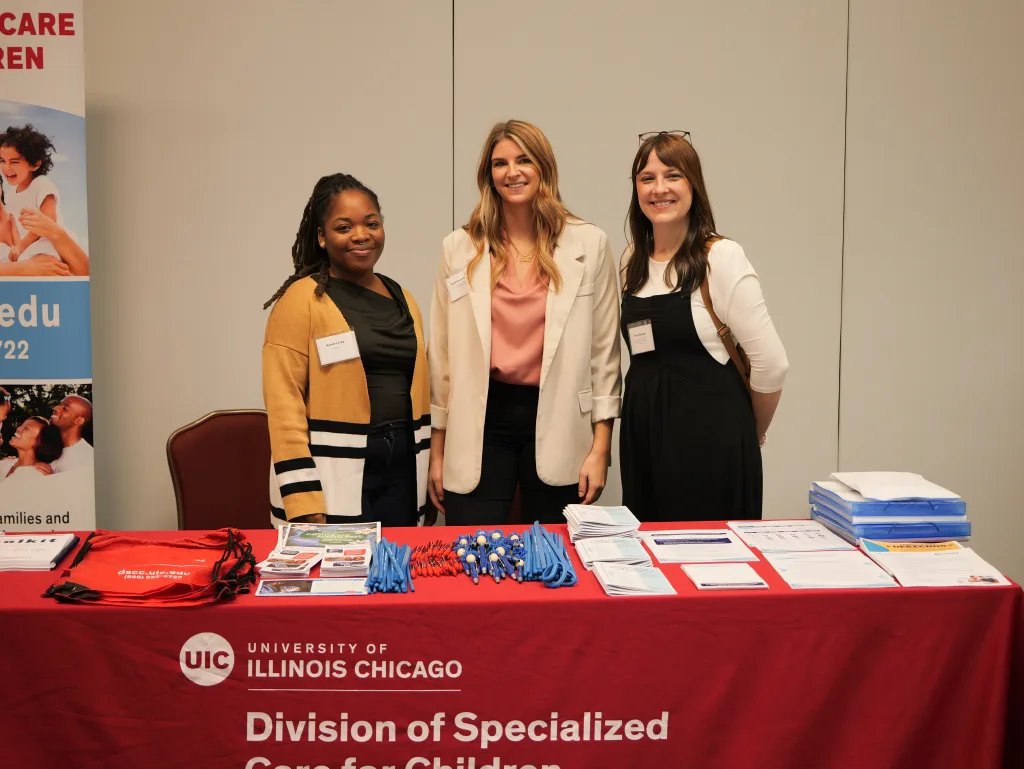
DSCC Home Care Family Outreach Associate Erica Stearns describes the annual conference as “a dream come true.”
Erica is the parent of two children enrolled with DSCC. Erica also has lived experience as an individual with disabilities.
“I was talking to another adult with disabilities before this interview, and it dawned on me, I didn’t grow up having this,” she said.
“To have an event where everyone is coming together for a similar purpose related to our children and their disabilities is incredibly meaningful, and it’s unique in that here we all are in one space.”
Erica highlighted the importance of ensuring youth and young adults have access to the information and resources they need as they transition to adulthood.
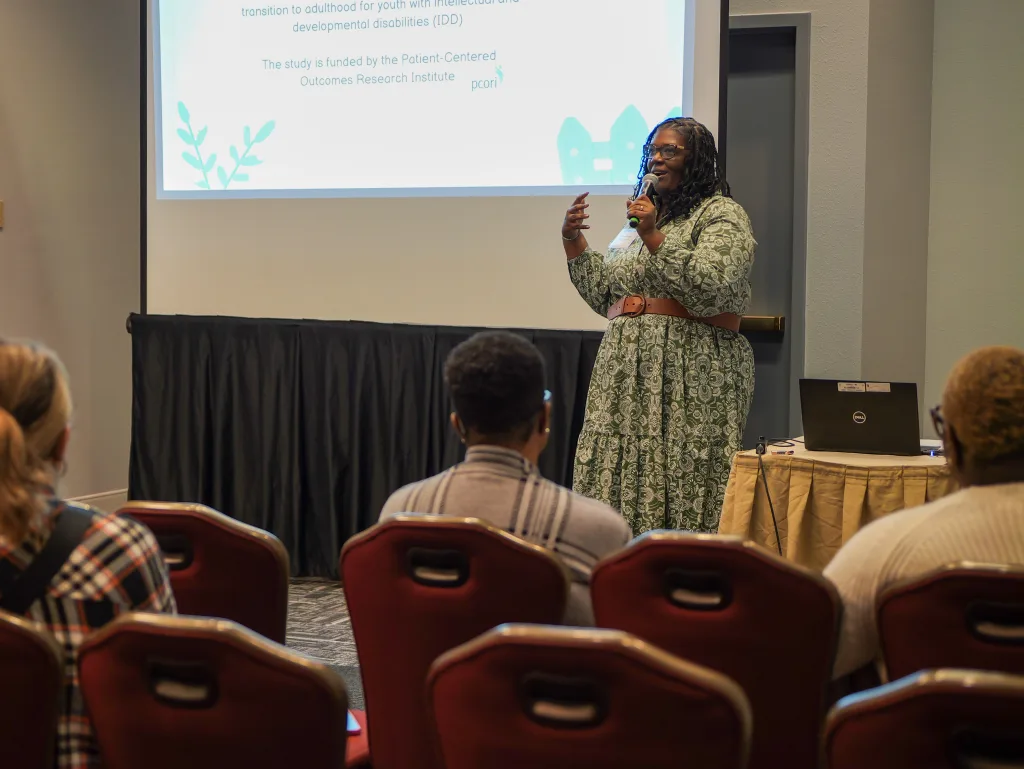
“It is abundantly clear that while we know that there are certain steps and certain paths that individuals with disabilities can take as they navigate their entry into adulthood, the information to prepare both their families and themselves for that is very challenging to find,” she said.
“I think most families feel empowered with knowledge. And I think that’s what this conference provides families is information, knowledge, tools and resources.”
DSCC helps sponsor the conference and serves on its steering committee. DSCC also provides financial support to help participant families attend the conference.
Claire Cook is DSCC’s Title V Transition Specialist and co-chair of the Transition Conference’s Steering Committee.
“Several families came back from last year,” said Claire. “We had about 20 or so individual families from DSCC, five of which were primarily Spanish speaking and several of our transition-age youth.”
“A lot of opportunities, a lot of information.”
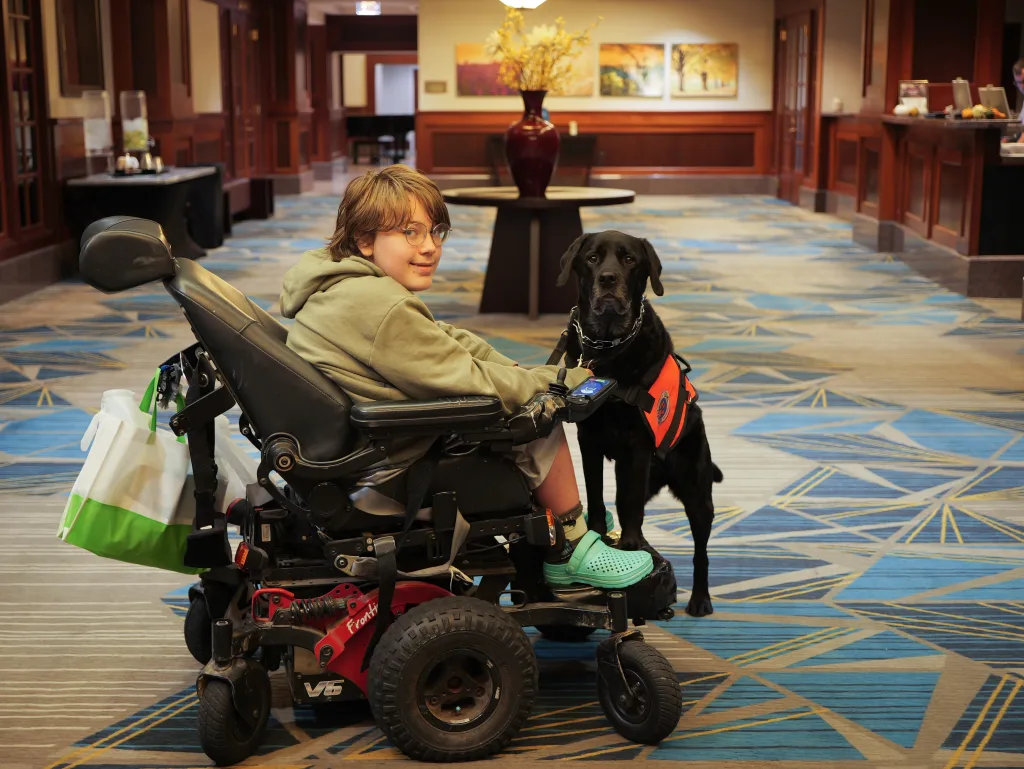
Jani, 14, attended the conference with his mom, Aimee, and sister, Grace.
Jani has spinal muscular atrophy (SMA). He first enrolled with DSCC when he was diagnosed with SMA, close to 12 years ago.
Jani described the conference as a positive experience with valuable information. He and his family gained resources, discovered new opportunities and made connections.
“We had a very nice family that was sitting by us (at lunch), whose son had a similar disability. It was just nice to talk to them and hear their story,” Jani said.
When asked if he would recommend the conference to other young adults, he said, “You should definitely come because it has a lot of opportunities, a lot of information. It’s just good to come to understand what’s going to happen, what they want to do later in life.”
After high school, Jani plans to go to college and become a teacher.
“I want her to be strong, and I want her to be confident.”
TaLeah, 17, attended the conference with her mom, Tamara. TaLeah first enrolled with DSCC 15 years ago, when she was diagnosed with hearing loss.
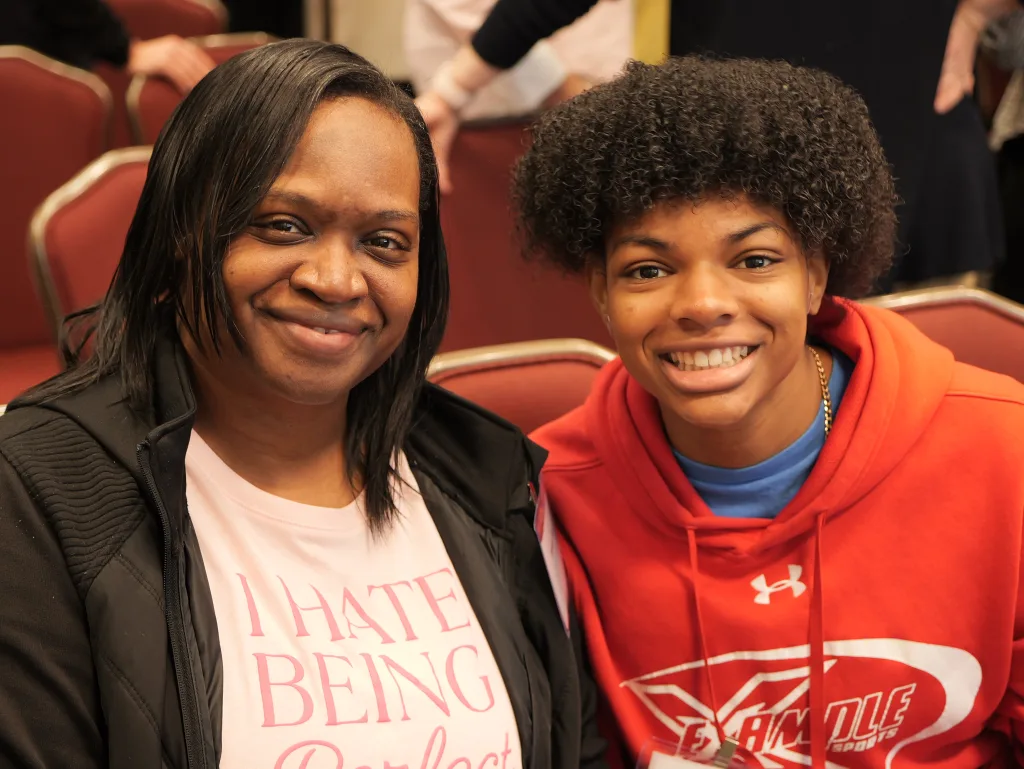
She is an accomplished basketball player who plans to go to college, play basketball and be successful.
“I want her to be strong, and I want her to be confident,” said Tamara.
“I want her to continue to advocate for herself and others. And I think she’s doing a good job thus far.”
Tamara said she is trying to give her daughter the best tools and equip her the best way she knows how.
“All this information is very helpful and hopefully it’ll help build her up.”
Brenton Braxton said the resources and knowledge his family gained at the conference will help him achieve his goals.
“I think some things from here that I learned is that not only I’ll still have my independence, but I can also use my parents to help me in my journey and to living it to the fullest and doing all the things I want to do,” he said.
On turning 18, he said, “It’s a big step, but I feel like with the support from my family and people around me, it’ll be good.”
Save the Date for the 2025 Transition Conference
The 2025 Illinois Statewide Transition Conference will take place Oct. 30-31 at the Crowne Plaza Hotel and Convention Center in Springfield.
To learn more about how to support youth with special healthcare needs during the transition to adulthood, contact DSCC at (800) 322-3722 or dscc@uic.edu.
For more information about the Transition Conference, visit www.illinoistransitionconference.org/.
Check out our Facebook page to see a photo album with more photos from the 2024 Transition Conference.
Gain Resources and Strategies to Help Your Child Prepare for Adulthood
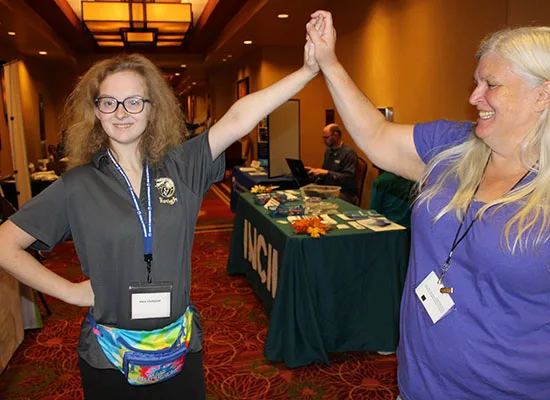
The 2024 Illinois Statewide Transition Conference is happening on Nov. 7-8 in Springfield
Luz Diaz said she struggled emotionally before attending the Illinois Statewide Transition Conference.
She felt isolated and unsure of the future for her daughter, Ariana, now 20. Ariana has cerebral palsy and quadriplegia along with hearing loss and developmental delays.
The knowledge she gained and the connections she made with other families during the 2023 conference immediately lifted her spirits. Luz now feels more hopeful for what lies ahead.
“Before I came here, I was depressed. I felt so lonely. Now that I’ve seen everything here, my thoughts have changed. I don’t feel lonely. I feel like I belong, and I feel like this is my family,” she said. “Now I feel like I’m not alone.”
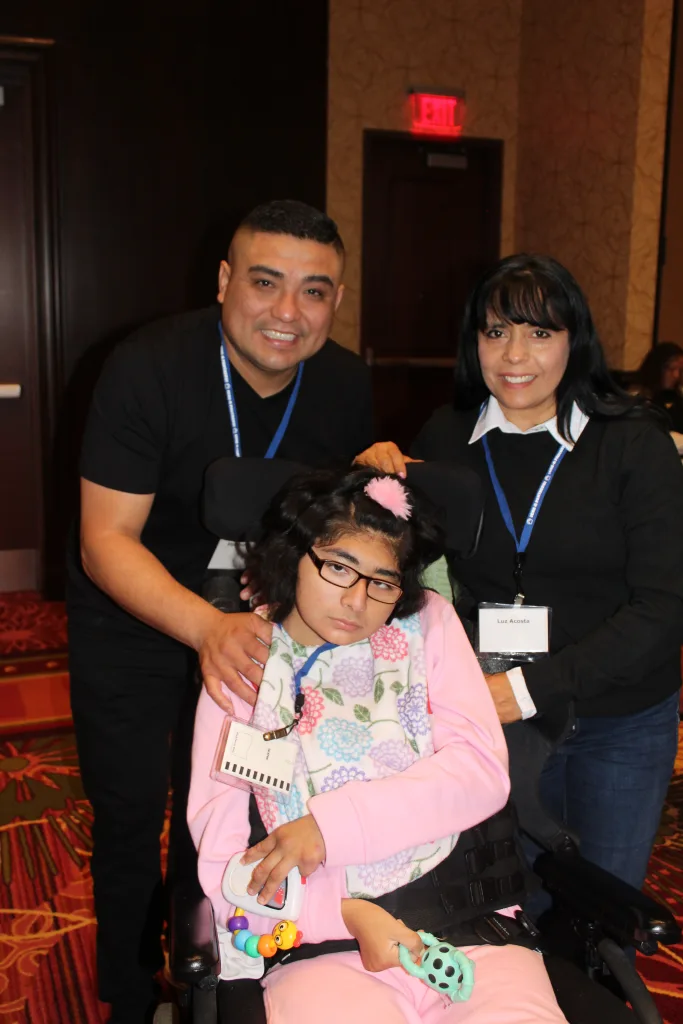
The Diaz family were among 370 people who attended the 2023 transition conference in person in Bloomington-Normal.
The conference, titled “Stepping Stones of Transition,” returns for 2024 at the Crowne Plaza in Springfield, Ill., on Nov. 7-8. This year’s event is in person only.
The conference highlights opportunities and resources available for youth and young adults with disabilities and complex medical needs as they transition to adulthood. It’s a “one-stop shop” for gaining valuable resources, making connections and learning alongside individuals who are on the same journey.
The “Stepping Stones of Transition” conference is for youth, parents, caregivers, vocational specialists, healthcare providers, educators and others who work with youth and young adults with disabilities.
Youth and young adults can visit vendors, attend workshops and learn how to plan for their future, including:
- What happens after I leave high school?
- How do I sort through the maze of resources?
- What steps can I take now to prepare for upcoming changes?
- What skills are important for me to develop?
Highlights for 2024 will include learning about supported decision-making from keynote speaker and self-advocate Derek Heard along with Allison Cohen Hall from the Center on Youth Voice, Youth Choice.
You can also attend sessions on:
- Self-determination
- Advocacy
- Employment
- Future planning
- Post-secondary education
- Health care
The Division of Specialized Care for Children (DSCC) helps sponsor the transition conference and serves on its steering committee. We also can pay for the conference-related expenses for our participant families to attend.
DSCC paid the conference-related expenses for 25 DSCC participant families to attend the 2023 conference that took place in Bloomington-Normal.
“An Amazing Opportunity to Learn and Connect”
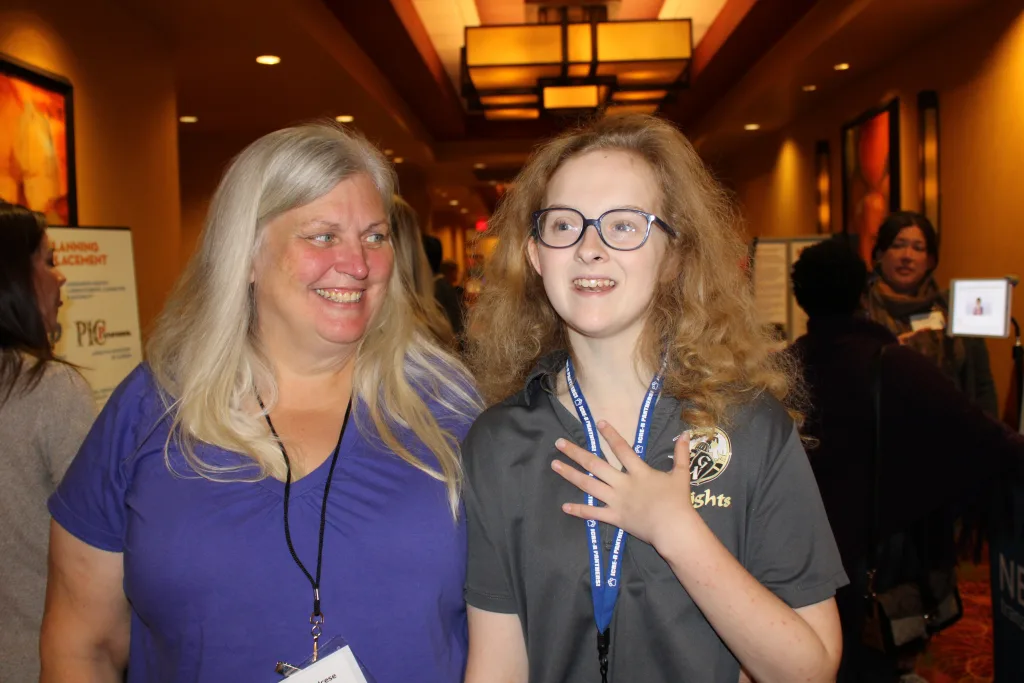
DSCC participant Vera Lynn Lindquist, 18, attended the transition conference both in 2022 and 2023. She has autism, attention-deficit hyperactivity disorder, anxiety disorder from childhood, tinnitus and hearing loss.
Vera enjoyed exploring the transition conference’s booths and sharing about the goals she has worked on.
“I know a lot more about autism awareness and speaking up and speaking out…” Vera said. “I’ve self-advocated at school. I reached out to my teacher on my laptop, I emailed him. I was behind on a lesson and let him know. He came and helped (me). It made all my teachers very happy.”
Vera attended the conference both years with her grandmother and legal guardian, Cheryl Calcese.
“We’ve used many of the independence and decision-making strategies we learned about,” Cheryl said. “Vera got a debit card. She has a money limit on it when she goes out for pizza and other group social events. She has an app on her phone to figure out the tax and tip. She adjusts everything according to her budget. She’s doing well with that and hasn’t gone over her budget once!”
The transition conference also gave Vera an opportunity to build her self-esteem and self-advocacy skills.
“She feels very comfortable at this conference, and it shows. She’s visiting with vendors and participating in sessions. Here her independence is shining. It’s very cool,” Cheryl said.
Cheryl also gained more resources and knowledge for herself.
“It’s always an amazing opportunity to learn and connect,” she said. “Thanks to the conference, I understand more about legal guardianship for adults and where to go for the paperwork for free or low-cost.”
Cheryl also learned more about the Americans with Disabilities Act (ADA).
“Vera and other students with disabilities had to miss their school homecoming,” she said. “In one of the sessions, I learned that the ADA covers social events. I connected with an organization that can help me make sure these students won’t miss their prom.”
Ariana’s mom, Luz, said she is grateful to everyone who organizes the conference so she can help give Ariana the best quality of life as she grows into adulthood.
Ariana’s father, Edgar, said he felt like the world was closing in on him before he attended the conference. By the end of last year’s event, he said he felt motivated after learning how conference speakers with disabilities advocated for themselves to have greater independence and a better quality of life.
Register and See the 2024 Schedule
The general public and professionals can visit the Statewide Transition Conference website to register and see more details.
For DSCC families, the conference schedule and more details are available:
- In English at: https://go.uic.edu/DSCC2024TransitionConferenceInfo
- In Spanish at: https://go.uic.edu/DSCC2024TransitionConferenceInfoSp
DSCC participants can register online:
- DSCC Transition Conference Sign-Up in English
- DSCC Transition Conference Sign-Up in Spanish
The deadline to register is Oct. 18. Please note that space is limited. Registration may close earlier if all spaces are filled.
Need financial help to attend?
If you are a DSCC participant family, we may be able to fund the conference-related expenses for your child and family, caregivers, nurse and/or personal attendant. These expenses include the cost of the hotel and transportation.
The Illinois Statewide Transition Conference Steering Committee has also set up a scholarship program to help youth with disabilities and their families attend the conference. The scholarship is open to:
- Individuals with disabilities
- Immediate family members of a person with a disability
- Guardians for a person with a disability
The amount of scholarship money available depends on each person’s needs.
Please fill out this scholarship form to apply. (The scholarship form is also available in Spanish.)
The deadline to apply for the conference scholarship is Oct. 18.
For more details or help with registration, please contact DSCC Title V Transition Specialist Claire Cook at (800) 322-3722, ext. 21812, or clairer3@uic.edu.
New Youth Advisory Council for Teens and Young Adults With Special Healthcare Needs

An opportunity for youth to help improve transition support and make a difference!
Youth with special healthcare needs should have a big role in shaping their future and helping improve support for others.
We want to hear from teens and young adults about what’s important and helpful to them as they plan for the future. Our new Youth Advisory Council is a great opportunity for them to share their input and make a difference.
The Youth Advisory Council (YAC) is a diverse, youth-driven group that aims to develop more youth-focused ways to help individuals and families with transition planning, resources and services.
The YAC’s goal is to support positive outcomes in adulthood for all Illinois youth with special healthcare needs in the areas of:
- Employment
- Health care
- Independence
- Quality of life
The YAC’s role is to:
- Bring a different and personal perspective on issues important to youth.
- Partner with the Division of Specialized Care for Children (DSCC) to help develop more youth-focused methods to enhance care coordination.
- Develop strategies to improve communication between youth/young adults and older adults.
Members participate in four virtual meetings per year.
Who is Eligible to Join the YAC?
The YAC is open to youth with special healthcare needs who are:
- Ages 15 to 24
- Living in Illinois
- Planning for the transition to adulthood in the areas of education, health care, employment and home and community-based support
Youth do not have to be a DSCC participant to join the council.
How to Join and Learn More
Members must complete an online application to join. (The application is also available in Spanish.)
Visit our Youth Advisory Council page for more information and answers to frequently asked questions.
You can also see the YAC flyer for more details:
If you have questions, please contact Claire Cook, DSCC’s Title V Program Transition Specialist, at clairer3@uic.edu or (800) 322-3722, ext. 21812.
2024 Health Insurance Education Webinar Series for Families Kicks Off in March
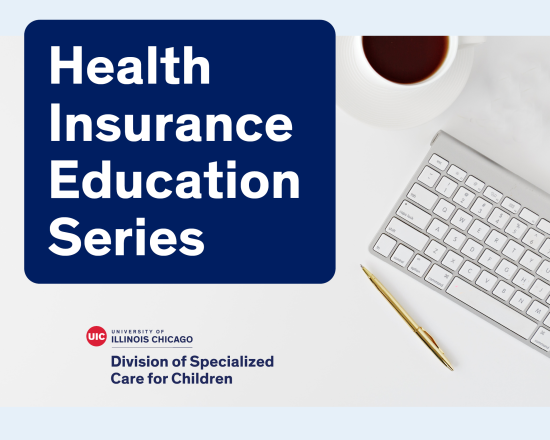
Free virtual training sessions for Division of Specialized Care for Children participants, their families and anyone interested in learning more about health insurance topics
Is figuring out your health insurance leaving you confused, frustrated or both?
Change your confusion to confidence with the University of Illinois Chicago’s Division of Specialized Care for Children (DSCC) Health Insurance Education Series.
These free trainings can help you better navigate your health insurance coverage and benefits. Each month, DSCC team members and other presenters will explain a different topic.
Each presentation will be in English. A Spanish interpretation line will be available during each session.
Check out the topics, mark your calendars and register for each session you’re interested in attending.
The session descriptions are in English followed by Spanish:
- Social Security Benefits, March 12 at 6 p.m.
- This training will help you understand Social Security benefits. Presenters from the Social Security Administration will share information about Supplemental Security Income and Social Security Disability Insurance. You will learn who can get benefits and how to apply for benefits. It will also cover what the Social Security program benefits are and how to keep your benefits.
- See the Social Security flyer for more details.
- Register on Zoom for Social Security Benefits
- Medicaid Denials, April 9 at 6 p.m.
- This training will help you understand Medicaid denials. It will review the common reasons that Medicaid denies services, such as equipment. The presentation will also share tips on how to avoid denials and what to do if Medicaid denies your services. This training will be for those with regular Medicaid and those enrolled in a managed care plan (MCO).
- See the Medicaid Denials flyer for more details.
- Register on Zoom for Medicaid Denials
- Transitioning Health Insurance Benefits to Adulthood, May 14 at 6 p.m.
- This training will help you understand how to transition health insurance benefits to adulthood. It will go over different insurance types, including Medicaid, Medicare and private insurance. This presentation will help you know what to start thinking about for health insurance benefits as you or your child nears adulthood.
- See the Transitioning Health Insurance Benefits to Adulthood flyer for more details.
- Register on Zoom for Transitioning Health Insurance Benefits to Adulthood
- Beneficios de Seguro Social, 12 de marzo a las 6 p.m.
- Esta capacitación lo ayudará a entender los beneficios del Seguro Social. Los presentadores de la Administración del Seguro Social compartirán información sobre el Seguro de Ingreso Suplementario y el Seguro de Incapacidad del Seguro Social. Aprenderá quién puede obtener beneficios y cómo solicitarlos. También cubrirá cuáles son los beneficios del programa de Seguro Social y cómo conservar sus beneficios.
- Consulte el folleto de Beneficios de Seguro Social para obtener más detalles.
- Enlace para registrarse
- Negaciones de Medicaid, 9 de abril a las 6 p.m.
- Esta capacitación lo ayudará a comprender las negaciones de Medicaid. Revisará las razones comunes por las que Medicaid niega servicios, como equipos. La presentación también compartirá consejos sobre cómo evitar negaciones y qué hacer si Medicaid niega sus servicios. Esta capacitación será para quienes tienen Medicaid regular y quienes están inscritos en un plan de atención administrada (MCO).
- Consulte el folleto de Negaciones de Medicaid para obtener más detalles.
- Enlace para registrarse
- Transición de los beneficios del seguro médico a la edad adulta, 14 de mayo a las 6 p.m.
- Esta capacitación lo ayudará a comprender cómo hacer la transición de los beneficios del seguro médico a la edad adulta. Tratará diferentes tipos de seguros, incluidos Medicaid, Medicare y seguros privados. Esta presentación le ayudará a saber en qué empezar a pensar en cuanto a los beneficios del seguro médico a medida que usted o su hijo se acercan a la edad adulta.
- Consulte el folleto de Transición de los beneficios del seguro médico a la edad adulta para obtener más detalles.
- Enlace para registrarse
You can also download a flyer with all the Health Insurance Education Series topics and registration links. (The flyer is also available in Spanish.)
The webinars are open to DSCC participants, their family members and anyone interested in these topics.
This is the second year for the DSCC Health Insurance Education Series. It began in response to DSCC families’ questions and suggestions from our Family Advisory Council.
Details about each series session are also posted on our Events page.
The 2024 Health Insurance Education Series is free for all attendees.
If you miss a session, you can access the recordings and related materials on our Family Education Webinars page.
If you have questions about these webinars before or after a session, email dscc@uic.edu or call (800) 322-3722.
We look forward to seeing you online!
Project to Improve Mental Health Support Benefits DSCC Teens
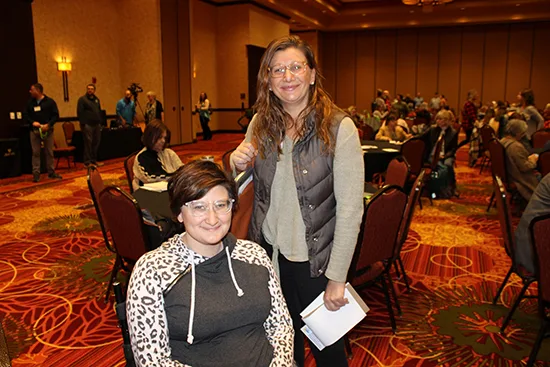
The B.E.S.T. study looks at how care coordination services that include mental health support can help teens with intellectual and developmental disabilities.
The teenage years can be a challenging time for all teens, including teens with intellectual and developmental disabilities (IDD).
Is your teen or young adult feeling sad, stressed or overwhelmed?
Consider joining the B.E.S.T. study. B.E.S.T. stands for Behavioral Health Stratified Treatment (B.E.S.T.) to Optimize Transition to Adulthood for Youth with IDD.
The B.E.S.T. study wants to know if care coordination services combined with mental health programming can help teens with IDD live happier and healthier lives.
All Division of Specialized Care for Children (DSCC) participants receive care coordination services. B.E.S.T. study participants receive access to additional behavioral and mental health resources and support.
DSCC participant Lily Kohtz, 19, (pictured on the left in the above photo) says her mental health has improved since taking part in the B.E.S.T. study.
Lily has spina bifida, uses a wheelchair and has difficulty with anxiety and depression due to her disabilities.
“I think a lot of people don’t connect anxiety or depression to having a disability,” she said. “The B.E.S.T. study has helped me talk about these things. We all have bad days, but depression is worse. Understanding how disability and mental health are tied together and having strategies to use to help me cope has really helped me.”
Lily says she’s enjoyed the online group sessions, where she now meets monthly with four other teens and a group leader. All meetings are confidential.
“We go over coping strategies such as controlling your thoughts and getting rid of the negative. I frequently use the skills we’ve learned and feel like my mental health has improved,” she said.
Lily’s mom, JoAnn Watkins (pictured on the right in the above photo), agrees that the study has benefitted Lily in many ways.
“I’ve seen a positive difference in Lily since she started with the B.E.S.T study. She’s using the skills she’s learned, and you can really see the improvement in her attitude and overall mental health.”
The study began recruiting participants in late 2022. More than 250 DSCC participant families have enrolled in the study so far.
Eligible DSCC participants must be enrolled in DSCC’s Core Program or Connect Care Program. (Please note that DSCC teens enrolled in the Home Care Program are not eligible to participate.)
The B.E.S.T. study is a free and voluntary project. Teens can join the study if:
- They currently have a DSCC Care Coordinator and are enrolled in DSCC’s Core or Connect Care programs.
- They are between 13 and 20 years old.
- They have an intellectual or developmental disability.
- They can comprehend at a fourth-grade or similar level.
- They can read and speak English.
- They have a computer, tablet or smartphone they can use to access the internet.
- They have permission from their parent, caregiver or guardian (if they are under 18).
The B.E.S.T. study team developed the project with input from a group of B.E.S.T. Study Scholars. These scholars are teenagers with IDD who tested and reviewed all of the B.E.S.T. study materials.
Teens who join the study are put into one of two groups:
- Group A receives care coordination services as usual from their DSCC Care Coordinator.
- Group B receives care coordination services and mental health support from the B.E.S.T. team. This support is based on each teen’s needs and can include:
- Mental health education
- Online group sessions
- Caregiver education and support
The study is a virtual program that will continue recruiting through December 2025.
The B.E.S.T. study is a partnership between DSCC and the University of Illinois Hospital and Health Sciences System (UI Health), the University of Illinois Chicago’s (UIC) Department of Disability and Human Development and the UIC Department of Pediatrics.
The principal investigators are Dr. Benjamin Van Voorhees and Dr. Kristin Berg.
The B.E.S.T. study team includes mental health professionals from Illinois, California and Massachusetts. They are all working together to find a way to promote the health and well-being of teens with IDD.
You can learn more information for both teens and parents/caregivers on the B.E.S.T. study website.
If you would like to join the study or have questions, please email the B.E.S.T. study team at beststudy@uic.edu or call (833) 732-5778.
If you choose to join, you and your family can support research that helps other teens and families.
Both parents/caregivers and teens must agree to be in the study. (Note that if a teen is their own legal guardian, they can participate alone or with a parent/caregiver if they choose.)
Those who join will be compensated for their time.
We’re excited to continue our partnership on this important research project!
Upcoming Education and Scholarship Opportunities for Young Adults with Disabilities
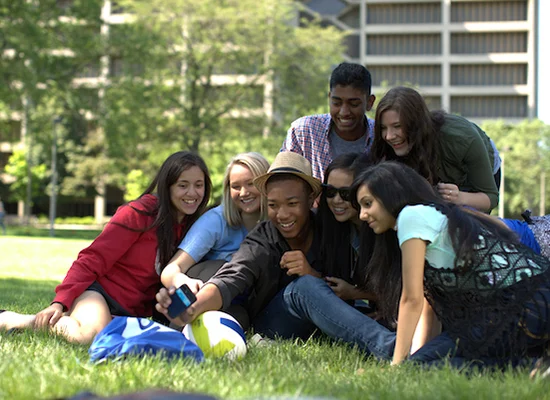
Learn more about the Illinois Community College Initiative and 2023 CSBG Scholarship Program
Finding the right programs and resources is key when planning for the future as a young adult with disabilities.
Two programs currently offer valuable education, training and scholarship opportunities for Illinois youth interested in college or joining the workforce after high school.
Illinois Community College Initiative
The Illinois Department of Human Services’ Division of Rehabilitation Services (DRS) wants to help people with disabilities in their quest for success.
The Illinois Community College Initiative provides academic and vocational training programs for eligible students with disabilities at in-state public community colleges and approved community colleges bordering the state.
People with disabilities who are eligible for the DRS vocational rehabilitation program are eligible to participate. You may complete community college coursework leading to an associate degree or to a degree, certificate or other industry-recognized credential or certificate.
DRS will help you with:
- Tuition
- The cost of fees, books and supplies
- Transportation costs
- Other eligible costs
See the Illinois Community College Initiative flyer for more details.
Spanish-speaking families can listen to the radio ad or read the ad transcript in Spanish.
Ready to get started? Contact your local DRS office using the locator tool or call (877) 581-3690. TTY and relay callers can dial 711.
2023 C.E.F.S. Economic Opportunity Corporation’s CSBG Scholarship
C.E.F.S. Economic Opportunity Corporation has a scholarship program to help students pay for college or occupational training.
The CSBG College Scholarship program provides financial help to income-eligible students living in the following counties:
- Christian
- Clay
- Effingham
- Fayette
- Montgomery
- Moultrie
- Shelby
You can use the scholarship to pay for formal education or occupational training in an accredited Illinois educational institution. Training and degrees may include:
- Associate, bachelor’s or master’s degree, post-secondary education
- General education, short-term training (two years or less) in growth occupation skills
The CSBG scholarship is competitive and awards students based on:
- Income
- The interview process
- Choosing to go into high technology areas or other growth occupations
Previous scholarship recipients can submit an application. You must be enrolled or intend to enroll as full-time students for the fall 2023 semester in an Illinois-accredited college. Full-time is 12 hours or more.
Click on the CSBG Scholarship application or get an application at your county C.E.F.S. outreach office. The application includes contact information for each local office.
You can also visit the C.E.F.S. website for more information.
You must complete your application and submit all requested documents to your local office by April 14 at 4 p.m.
All eligible candidates will have an interview in May.
Find More Transition Resources
Visit the Transition Tools section of our website to find more programs and information to help with planning and paying for college, getting a job and more.
You can browse the Transition: Education Resources and the Transition: Work Resources categories to find what you need.
Our team is also here to help partner with you and your family to help make the transition to adulthood as successful as possible.
Contact us to find out more!
Meet Medical Advisory Board Member Dr. Shubhra (Sue) Mukherjee
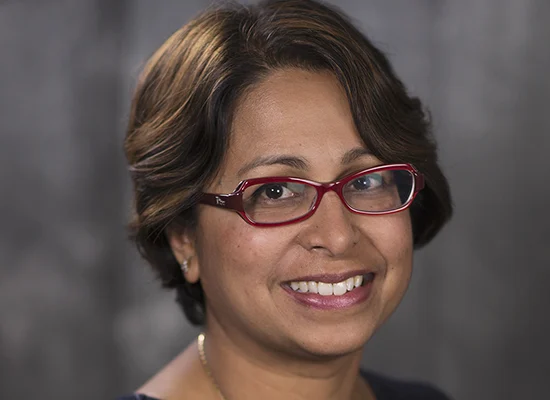
“DSCC understands the importance of supporting families and coordinating care.”
Dr. Shubhra Mukherjee, also known as Dr. Sue, is the medical director of pediatric and adolescent rehabilitation medicine at Shriners Children’s Chicago.
Mukherjee currently cares for patients up to age 22. Her background includes working with young adults with complex healthcare needs and collaborating across medical specialties to help these patients and their families connect with the care they need.
She has served on the Division of Specialized Care for Children’s (DSCC) Medical Advisory Board (MAB) for more than 16 years.
Mukherjee’s expertise in physical medicine and rehabilitation combined with a deep interest in the transition of care for children with complex healthcare needs has been a great fit.
“DSCC understands the importance of supporting families and coordinating care,” said Mukherjee. “I appreciate their statewide focus and how the MAB serves as an avenue for clinician input on what changes are needed, sharing feedback about the struggles we encounter helping patients get what they need, and working together to find solutions.”
Putting the Focus on Transition
When Mukherjee joined the board, schools were just beginning to explore the need to help students build the skills needed to transition to adulthood.
“They were looking at ways they could better prepare students to go on to jobs, college and life after high school,” Mukherjee explained. “In pediatric care, we realized that we needed to be doing the same thing for children with complex healthcare needs and their families.”
The DSCC team had the idea to increase the participation of medical professionals at the annual Illinois Statewide Transition Conference. We wanted to create a more proactive approach to helping children and their families make the transition from pediatric care to adulthood.
Mukherjee teamed up with DSCC’s former Title V Transition Specialist Darcy Contri to help put the idea into action.
“DSCC was already doing great work providing family support, tip sheets, and facilitating face-to-face conversations about transition. This was just one more piece of the puzzle,” said Mukherjee. “Darcy and I set up the first health care track for the Statewide Transition Conference with a goal of building more clinical engagement and increasing awareness and support for patients with complex health care needs and their families.”
The health care track has provided information and presentations with and for doctors and others providing complex care. According to Mukherjee, it continues to be a catalyst for building connections, sparking ideas, and inspiring healthcare professionals.
“I got to see that impact firsthand when one of our occupational therapists (OT) attended the conference with me,” Mukherjee said. “She was so moved that she became a big proponent of the OT’s role in developing and teaching adolescents skills related to health care.”
Opportunities to Collaborate
Mukherjee appreciates how the MAB fosters collaboration, networking and the development of partnerships. This work continues to create more options throughout Illinois for patients with complex care needs.
“It’s very rewarding to grow my knowledge and connect with like-minded professionals across so many different specialties,” Mukherjee said. “We’re able to share, provide feedback, and exchange ideas around removing barriers and supporting patients with complex healthcare needs at all stages.”
Mukherjee said DSCC also continues to be a major source of support for her own patients.
“Care coordination is so important for these families,” said Mukherjee. “DSCC helps them find the right care or specialist, get to appointments, and locate funding for the services they need to stay well and engage in their community. DSCC is there for the child and family.”
Mukherjee also leans on DSCC for updates and information.
“DSCC helps me keep track of program changes and learn about new services or programs that are available,” Mukherjee emphasized. “DSCC plays a vital role in sharing information and connecting the many different entities that individuals with complex needs depend on for their care.”
Awareness Brings Progress
Mukherjee said there is still a great need for education about the transition to adulthood and its importance.
“I’m glad to see the growing awareness and interest by professionals in helping youth develop the skills they need to be successful as adult users of the healthcare system,” said Mukherjee. “We are seeing more adult providers who understand the needs of young people with disabilities who are aging out of pediatric care.”
Awareness has brought progress, but challenges remain.
“Pediatric and adult care are not set up in the same way. For example, a spina bifida clinic and spinal care clinic are similar, but they are not the same. Adults with complex conditions going to a spinal care clinic may not be getting all of their needs met,” said Mukherjee. “The special pediatric clinic that addressed all their needs as a kid doesn’t exist in the adult care system.”
Mukherjee’s own focus on the transition to adulthood remains as strong as ever.
“I’ve been following some of the research initiatives at the University of Illinois Chicago. It’s exciting to see they are collecting data, exploring different aspects of complex care and its costs, and working towards building a framework that brings all the pieces together for adults with complex care needs,” she said.
“DSCC plays a vital role,” Mukherjee noted. “Sharing their information and ensuring it’s always there for the families we serve is important.”
Thank you, Dr. Sue, for your leadership to help families and professionals support the successful transition to adulthood!
Visit our Medical Advisory Board page to learn more about the MAB and its mission.


